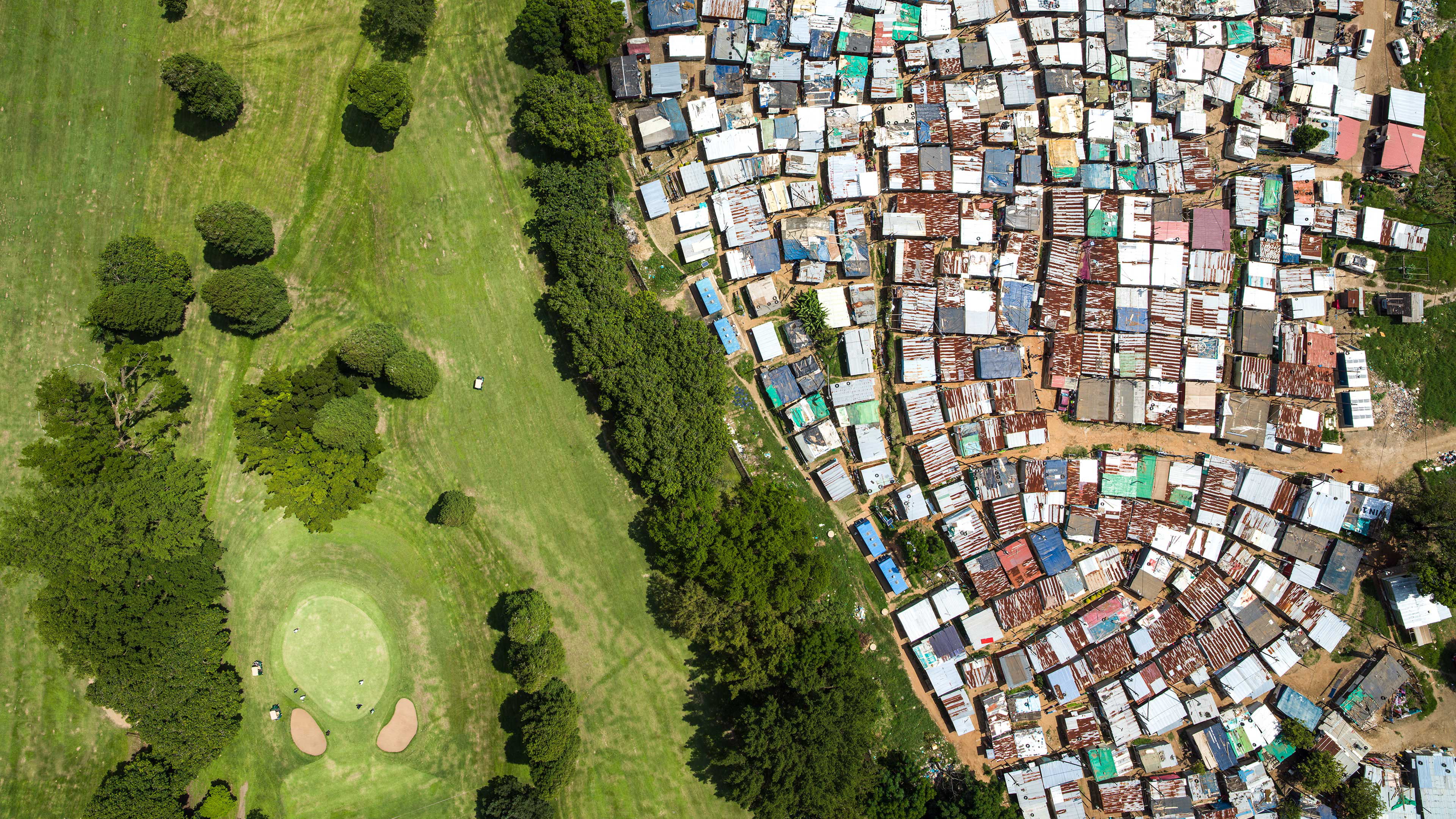Climbing out of bed and being knee deep in water from monsoon water flooding. Worrying about cholera or dengue fever outbreaks and coronavirus. Being harassed by men who control the water wells. Living in a country that does not follow science.
These are all situations students, journalists, young leaders and activists told us they or others close to them have found themselves in because of the impacts of the climate crisis.
In India, the monsoon season is becoming shorter and more unpredictable; in Yemen, flash flooding is further destabilising a country with hardly any infrastructure to begin with; in Zimbabwe, water has become scarce due to low rainfall and polluted rivers; and in Egypt, young people who try to raise awareness about climate change say they are not taken seriously.
We only have 10 years to do the work of cutting greenhouse gas emissions. This is the only way that the world can reach net zero carbon emissions by 2050 to be safely habitable.
In a transnational chat, 14 young people told us what stories are missing from the climate debate. We spoke about inclusivity, safety, representation, and the very real impact that the most polluting nations have.
Here are the five key takeaways.
1. People around the world are already feeling the effects of the climate crisis, so the movement has to be inclusive
Sahar Mohamed, 29, was "surprised" when flash flooding from storms around the Gulf of Aden, which killed 17 people, didn’t make global headlines. ‘The media is focusing on the west and countries like mine are rarely mentioned, unless it’s war related news," she says. "But Yemen’s climate has already changed."
Across the Red Sea, Lina Yassin saw the Nile reach its highest level of flooding in Sudan this year. "How long can fragile countries like Sudan, Yemen and many others last while world leaders still question the science behind climate change and slow down the climate negotiations?" asks the Sudanese journalist (23).
Activists stay in dialogue with affected communities, using the wisdom of Indigenous people in the Philippines to the Afro-Colombian community. "Very few Senegalese people know about climate change," says Maureen Damen, 16, "but they know that our planet is getting warmer". In Uganda, Nirere Sadrach wonders "how a COP Africa regional committee can be manned by only White people ... don’t we have Africans that can do so? And corporations and organisations are still not recruiting local talent."
The international community has to be more inclusive of those on the frontline.
2. The US has a serious impact on the climate of countries around the world
In no uncertain terms, Munnira Afrikana Katongole, 17, condemns "the lack of accountability by developed nations whose wealth continues to be attained from colonialism and imperialism, which was the primary driver of the climate crisis".
Kaossara Sani, 25, of the Act on Sahel movement agrees: "High-income nations need to stop their overconsumption and stop building their happiness and progress with the destruction of poor nations’ natural resources and environment." She says the west African state of Togo is "eco-friendly", but its coastal communities on the Gulf of Guinea are at risk.
This is why the US formally withdrawing from the historic Paris agreement – one day after the 2020 elections – came as a "blow" to the Pacific Islands, says Belyndar Rikimani, 23. "We are living on borrowed time, as we are experiencing the impacts of [the] climate crisis every day of [our] lives."
Climate-denying administrations in Australia and Brazil did not follow the US out of the climate agreement. However, journalist Ahmed Sabaa Elill, 27, sees the impact in Egypt. "We are still talking about our experiences and reality with an absence of figures and statistics. We, young people, are unable to release our ideas and opinions very freely."
As an "immigrant living in a superpower nation", Coral Estefania Alonso Garcia wants the US to take charge because her own country can’t. The US is the world’s second-largest polluter after China. "Mexico is a developing country that does not have the same technology as the US," says the nursing student based in Colorado. "How can we afford that kind of change?"
3. Forget the term ‘global south’ – use MAPA
First coined by activists from the Extinction Rebellion group, "Most Affected Peoples and Areas" has been welcomed by climate movements worldwide to replace the term "global south".
"It is very vague, othering, derogatory, and defines us as poor (when we’re so rich in resources)," says Mitzi Jonelle Tan, a 23-year old activist from Manila. "‘Most Affected Peoples and Areas’ also doesn’t limit it to just the countries that are most affected (because of our lack of capability to adapt to the impacts) – it also includes BIPOC, it also considers the race, gender, and class struggle."
The move recognises people over GDP. "The term global south was used to measure us in monetary terms and development instead of the issues we face," says Disha Ravi, 22, from Bangalore. "We are made to be voiceless when the truth is that we have been screaming about our issues but we haven’t been heard. We wanted to change that and ensure that we are involved in climate conversations and negotiations."
Why not decentralise these international climate negotiations? The COP 26, which should have been happening now, from 9-19 November 2020, has been postponed by a year because of the pandemic. "Holding these events in MAPA countries is a win-win because the people from the economic powers would finally feel and understand our issues and demands (our stories)," says Laura Verónica Muñoz, 23. "People in MAPA countries will feel hope and will have more opportunities to participate in international negotiations."
4. People are murdered fighting for the climate – despite an international agreement to protect them
How do we protect our environmental and human rights? The ideal of empowering people with this information goes to the core of a unique global accord signed in Escazú, Costa Rica, by 24 states in 2018. But Ricardo, who works as a coordinator in the Honduran arm of the Escazú agreement, says it is a "battle they are losing", especially when it comes to "an intergenerational solution that could lay the foundations to transform the extractivist realities of our countries". Sofia Hernández, 22, challenges our perceptions of Costa Rica: "the ‘green country, leader in human rights’, is becoming again an extractivist country".
Ricardo is from a country known globally for the assassination of environmental defender Berta Cáceres in 2016. "Latin America is the most violent region for defenders of the environment," says Ricardo.
This generation of climate activists knows what harassment feels like
This generation of climate activists knows what harassment feels like. Activists are doing their bit to clean up the polluted Lake Chivero, the main water supply for Harare, Zimbabwe, but water scarcity is a "burden to African women", says Collette Levy Brown. The 18-year-old founder of ZimYouthVoicesForClimate says girls and women experience sexual harassment when they are forced to walk to wells for water.
We don’t hear the story of the fishermen on their way to congress in Costa Rica who were shot at, says Sofia Hernández. She has been raising awareness about an ocean-trawling law, which would have had a harmful impact on biodiversity. As we spoke, there were two climate activists on hunger strike in front of the presidential palace. "To protect our ecosystems, we need to protect those on the frontlines," she says.
The Philippines was the most murderous country in the world for environmental defenders in 2018. Mitzi Jonelle Tan, 23, has been labelled a terrorist ("calling for system change is now defined as terrorism with the new Anti-Terrorism law of 2020," she adds) and received death threats. "No one knows our stories, no one knows our struggle," she says. "The next time you think of the Philippines, I hope you think of how we continue to fight back and you are inspired by our movement instead of being sad for us."
5. Climate justice is a right – and our work is never done
The shift in the discourse about climate change is slowly normalising the idea of climate justice. "Climate justice is our right," says Disha Ravi, 22. "76 million people in India have no access to a safe water supply and it’s only getting worse."
From Vanautu, Belyndar Rikimani is taking her demands to the International Court of Justice in The Hague with the group she co-founded, Pacific Islands Students Fighting Climate Change. "It would integrate areas of international law that are currently separated, like human rights and environmental law," the law student, 23, explains.
The stories of the climate debate will just keep coming, and these young climate activists should keep being heard
Some countries have been lauded for reaching their targets for net zero emissions by 2050, such as Japan, the world’s fifth-largest emitter. Erina Imai, who founded Fridays for Future in Kyoto, says people can and still must do more.
The US president-elect has pledged to rejoin the Paris Agreement, getting the country back on track to net zero emissions. Activists say they are optimistic. "I believe Biden will listen to us from the Most Affected Areas," says Maureen, the 16-year-old founder of Fridays for Future Senegal and Rise Senegal. "This presidential election is another way for us to obtain climate justice." Mitzi says: "Biden’s climate policies are so progressive because of the youth climate movement in the US ... Our next step globally is to make sure these policies come to fruition."
Things change all the time, and not for the better. Since this transnational chat, a super typhoon hit the Philippines, displacing a fishing community in Bacoor, Cavite, which has long been fighting a reclamation project. And while the Costa Rican ocean trawling law has been reversed, "we are now facing open pit mining bills in Congress," writes Sofia Hernández. The stories of the climate debate will just keep coming, and these young climate activists have to keep on being heard, on their terms.
Many thanks to Kaossara Sani (Togo), Ahmed Saba (Egypt), Mitzi Jonelle Tan (Philippines), Disha A Ravi (India), Belyndar Rikimani (Pacific Islands), Ricardo Andres Pineda Guzman (Honduras), Coral Estefania Alonso Garcia (Mexico/ US), Collette Warona Levy-Brown (Zimbabwe), Laura Veronica Muñoz (Colombia), Munnira Afrikana Katongole (South Africa), Sahar Mohamed (Yemen), Sofia Hernandez (Costa Rica), Elizabeth Wathuti (Kenya) and Maureen Damen (Senegal) for joining our chat. We were happy to welcome back Lina Yassin (Sudan), Nirere Sadrach (Uganda) and Erina Imai (Japan) from our transnational chat from 2019.
Dig deeper
 Why climate change is a civil rights battle
Climate disasters are not ‘natural’ – they’re human made. If we want to fight climate change, we first need to tackle inequality and racism.
Why climate change is a civil rights battle
Climate disasters are not ‘natural’ – they’re human made. If we want to fight climate change, we first need to tackle inequality and racism.


